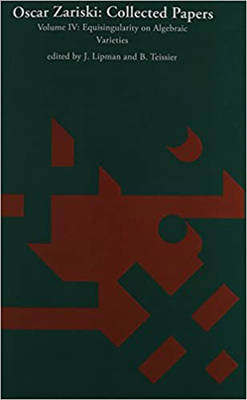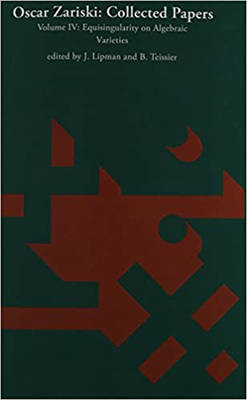
- Retrait gratuit dans votre magasin Club
- 7.000.000 titres dans notre catalogue
- Payer en toute sécurité
- Toujours un magasin près de chez vous
- Retrait gratuit dans votre magasin Club
- 7.000.0000 titres dans notre catalogue
- Payer en toute sécurité
- Toujours un magasin près de chez vous
62,95 €
+ 125 points
Format
Description
Oscar Zariski, one of the most eminent mathematicians of our time, climaxed a distinguished career by receiving the National Medal of Science. He has enriched mathematics, particularly in algebraic geometry and modern algebra, by numerous and fundamental papers. This volume is the first of four in which these papers are available in collected form.By introducing ideas from abstract algebra into algebraic geometry, Zariski undertook to rewrite its foundations completely, taking an approach that made no use whatsoever of topological or convergent power series methods and that made no appeal to vague geometric intuition. The most important characteristic of this approach toward algebraic geometry, and in particular toward the problem of resolution of singularities, is that it uses the available power of modern algebra as fully as possible not only as a source of techniques in each step of solving a specific problem but also in reformulating the problem at a fundamental level. Professor Hironaka writes, "By this type of fundamental approach (not to mention specific techniques he invented to overcome specific difficulties in the problem), he made it much easier for other mathematicians in later works to follow the tracks and make further progress."The present work contains 10 papers on foundations and 9 on the resolution of singularities that were first published between 1937 and 1967. In them, new methods are introduced that enabled Zariski to study algebraic geometry over arbitrary fields of coefficients. This broader outlook made it possible to solve certain classical problems using ideal theory and the theory of valuations that had long been regarded as too difficult to be handled.Among the basic problems whose solution is found in these papers are the local uniformization of all algebraic varieties, the reduction of singularities of 2- and 3-dimensional varieties, the introduction of the concept of normal variety which is now universally used, and the proof of "Zariski's Main Theorem.""Oscar Zariski: Collected Papers" is part of the series Mathematicians of Our Time, edited by Gian-Carlo Rota.
Spécifications
Parties prenantes
- Auteur(s) :
- Editeur:
Contenu
- Nombre de pages :
- 678
- Langue:
- Anglais
- Collection :
- Tome:
- n° 4
Caractéristiques
- EAN:
- 9780262519540
- Date de parution :
- 26-09-79
- Format:
- Livre broché
- Format numérique:
- Trade paperback (VS)
- Dimensions :
- 183 mm x 254 mm
- Poids :
- 1188 g

Les avis
Nous publions uniquement les avis qui respectent les conditions requises. Consultez nos conditions pour les avis.






